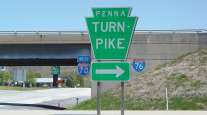Missouri Lawmakers Hold Town Hall on Transportation Funding

Missouri legislators will likely consider increasing user fees and placing tolls on existing interstates at state entrances in an effort to increase funding for the Missouri Department of Transportation.
State Rep. Jeff Messenger, chair of the Missouri House Policy Development Caucus, held a town hall on transportation funding on Aug. 1 in Kirksville. Caucus members Rep. Nate Walker and Rep. Mike Moon also participated with the presentation.
The event was a part of a series of town halls the caucus members will host to gain feedback on transportation funding ideas and potentially use that in future legislation.
“Our job in PDC was to take on the hard issues and the very first issue we took was transportation,” Messenger said. “We’re going to run something through the legislature this year to try and get off the fence so we can start moving.”
Currently, MoDOT receives about $2.4 billion in total revenue each year, with about $911 million coming from the federal government through funding programs. About $1.4 billion of the revenue comes from user fees, like car titles, registration and drivers’ license fees.
Of that $2.4 billion, $1.4 billion goes toward state roads and bridges and $408 million goes to cities and counties.
The state of Missouri has 33,873 miles of road that MoDOT manages. Missouri’s current fuel tax is 17 cents per gallon, but has the purchasing power of 8 cents per gallon today, according to MoDOT.
Fees for vehicle registration and drivers’ licenses have not increased since 1984, while some other fees haven’t increased since 1969, Messenger said.
“There’s two issues here: No. 1, we didn’t stay with inflation and No. 2, is we have too many roads,” Messenger said. “It’s no wonder MoDOT is having an issue with having enough funding, because our vehicles haven’t changed; we’re still operating with about 4.3 million vehicles in the state of Missouri.”
Licensed Missouri drivers pay about $30 each month in state and federal transportation taxes and fees, which Messenger said is much less than the monthly price for other services people use.
“That’s not very much for what we pay for a cellphone or what we might for satellite television,” Messenger said. “I think the big issue is trying to get the public to understand that we spend a lot more for other things than we do for our infrastructure in our state. I think the issue here is how do we message that to get the taxpayers to vote for certain things?”
MoDOT needs about $825 million, or about $16 more per month in taxes and fees from licensed Missouri drivers, to improve the state’s transportation infrastructure.
Of that $825 million, $300 million would go toward major interstate reconstruction, $275 million toward projects that increase economic growth and improve safety, $170 million toward road and bridge improvements and $80 million toward multimodal transportation improvements.
Messenger said caucus members are looking to help MoDOT get to that funding goal through several options, which include adjusting the consumer price index on fuel, increasing the motor fuel tax, user fees and the general sales tax, transferring low volume roads to cities and counties, placing tolls at state entrances and implementing an open container law.
One scenario stated a five-cent motor fuel tax would generate about $205.3 million, while a 5% tax would generate about $331.8 million and would need voter approval.
A 1% increase to the motor vehicle sales tax could provide $114.1 million additional funding for roads and bridges, according to MoDOT. A 1% general sales tax increase, excluding the motor vehicle sales tax, could result in about $700.8 million in funding, while a 1% general sales tax increase, with the motor vehicle sales tax, could generate about $815 million.
“This would be a solution to it. It doesn’t solve the problem of inflation, it just gets us the sales tax money,” Messenger said. “What the PDC is trying to do is fix some of the problems down the road because in 20 years if we don’t put inflation in there, we’re going to be addressing the same problems.”
Scenarios on implementing a consumer price index (a measure of the average prices paid by consumers for goods and services) on user fees and motor fuel taxes that would result in additional revenues for MoDOT were also presented during the town hall.
Messenger said currently lawmakers are leaning toward putting together legislation on implementing a consumer price index, raising user fees and opening discussions on toll roads.
“We want to solve the problem just as bad as you want the problem to be solved,” Messenger said.
Distributed by Tribune Content Agency, LLC



